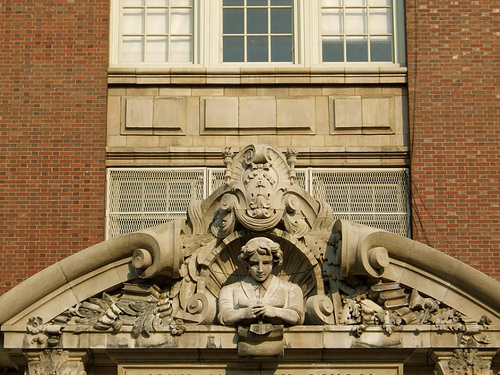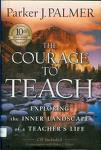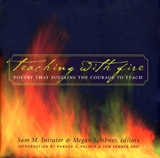 The evening weather has been cool and crisp, making it feel all the more as if autumn is approaching. Every night this week we’ve heard the nearby Dallastown High School drum-line practicing, a bittersweet sound that assures us that it is back-to-school time.
The evening weather has been cool and crisp, making it feel all the more as if autumn is approaching. Every night this week we’ve heard the nearby Dallastown High School drum-line practicing, a bittersweet sound that assures us that it is back-to-school time.
In my last post I told of giving a presentation for college faculty reflecting upon their job as Christian teachers and mentors. I mentioned books not only important for collegiate staff and educators, but for students themselves heading back to dorms and student unions. Some readers of BookNotes, though, are going back to public schools, elementary or high schools, to take up their posts anew in the fresh fall air.
One of my life heroes is Jonathan Kozol, whose early books in the 70s reminded us of the politics of schooling, the way curriculum—what is taught and what isn’t—is more than transmitting data, but the shaping of values such as concern for common-good citizenship and social justice. Kozol, you may recall, was fired from an impoverished Boston ghetto school in 1964 for using a Langston Hughes poem that was, as they said, unauthorized. He won the prestigious National Book Award for Death at an Early Age in 1968, a book that riveted me and has not quite let go, decades later. The Night Is Dark and I Am Far From Home, now out of print, remains one of the very most influential books I’ve ever read.
Kozol has gone on to study, describe and protest what he has called the “savage inequalities” of our schools, with some being quite beautifully well-off and others being poor and under-funded. As an advocate for children, especially those forced to attend bad schools, he has made his mark. His last large book about these things, just a year or so ago, and now in paperback, was The Shame of A Nation: The Restoration of Apartheid Schooling in America. (For the record, as much as I esteem Mr. Kozol—and cherish a long car ride I once had with him talking mostly about Jesus and His radical politics—I think he is misguided in his critique of school vouchers, Charitable Choice, and such.)
 His very lovely new collection of thoughtful letters to a first year teacher, Letters to a Young Teacher (Three Rivers Press; $12.95) recently came out in paperback. It would make a wonderful “back to school” gift for a teacher of any kind, and Kozol’s practical advice (even a recipe for making goo) would be inspiring for a young, new teacher or an older more experienced one. His advice is almost always spot on, and his tone is not the least bit condescending. He is a radical thinker and a prophetic voice for justice, but this book is less about his social vision and more about his classroom demeanor (which is, nonetheless, informed by a deep humanistic vision of care for the students and the need to sometimes work to reform educational institutions.) We commend it to anyone who wants to think a bit about the profession of teaching.
His very lovely new collection of thoughtful letters to a first year teacher, Letters to a Young Teacher (Three Rivers Press; $12.95) recently came out in paperback. It would make a wonderful “back to school” gift for a teacher of any kind, and Kozol’s practical advice (even a recipe for making goo) would be inspiring for a young, new teacher or an older more experienced one. His advice is almost always spot on, and his tone is not the least bit condescending. He is a radical thinker and a prophetic voice for justice, but this book is less about his social vision and more about his classroom demeanor (which is, nonetheless, informed by a deep humanistic vision of care for the students and the need to sometimes work to reform educational institutions.) We commend it to anyone who wants to think a bit about the profession of teaching.
The Courage to Teach: Exploring the Inner Landscape of a Teacher’s Life by Parker Palmer (Jossey-Bass; $27.95) may be the most talked about book for teachers of the last decade, and for good reason. Palmer, the profound writer, mystic, Quaker, activist, is another favorite of ours, and this book emerged firstly from his spectacular work on educational theory—exploring a Hebrew view of what it means to know (To Know As We Are Known: Education as a Spiritual Journey which is a very important little book indeed.) After that meditation on forming educational communities of deep knowing and responsible caring (rather than teachers being the sole transmitter of abstract facts) where education makes a personal, even spiritual, difference, he set off doing workshops for educators. His masterpiece The Courage to Teach emerged from those workshops (followed by a beloved book on vocation, Let Your Life Speak, which he tells us was written after being so inspired by so many teachers who seemed to truly be called—vocare–into this line of work.) A new anniversary edition was released recently of CtT and a fabulous follow up has been compiled as a companion study/reflection book, too. You can follow some of Parker Palmer’s other work, listen to podcasts and such, at the Center for Courage & Renewal. (Fans should know that his very first book, The Promise of Paradox, has also recently been reissued in a great little hardback!)
(Jossey-Bass; $27.95) may be the most talked about book for teachers of the last decade, and for good reason. Palmer, the profound writer, mystic, Quaker, activist, is another favorite of ours, and this book emerged firstly from his spectacular work on educational theory—exploring a Hebrew view of what it means to know (To Know As We Are Known: Education as a Spiritual Journey which is a very important little book indeed.) After that meditation on forming educational communities of deep knowing and responsible caring (rather than teachers being the sole transmitter of abstract facts) where education makes a personal, even spiritual, difference, he set off doing workshops for educators. His masterpiece The Courage to Teach emerged from those workshops (followed by a beloved book on vocation, Let Your Life Speak, which he tells us was written after being so inspired by so many teachers who seemed to truly be called—vocare–into this line of work.) A new anniversary edition was released recently of CtT and a fabulous follow up has been compiled as a companion study/reflection book, too. You can follow some of Parker Palmer’s other work, listen to podcasts and such, at the Center for Courage & Renewal. (Fans should know that his very first book, The Promise of Paradox, has also recently been reissued in a great little hardback!)
 Many who have been in the network promoting Parker’s model of teaching with the heart were asked what keeps them going, and particularly, if poetry helps. Many sent in poems, with a brief description of why this particular work is taped to their classroom desk, or in their lunchroom, or in the cover of their grade-book. These “teacher-selected” poems have been compiled by Sam M. Intrator in a lovely hardback, Teaching With Fire: Poetry That Sustains the Courage to Teach (Jossey-Bass; $16.95.) It, too, would make a lovely “welcome back to the classroom” gift for any teacher, old or young.
Many who have been in the network promoting Parker’s model of teaching with the heart were asked what keeps them going, and particularly, if poetry helps. Many sent in poems, with a brief description of why this particular work is taped to their classroom desk, or in their lunchroom, or in the cover of their grade-book. These “teacher-selected” poems have been compiled by Sam M. Intrator in a lovely hardback, Teaching With Fire: Poetry That Sustains the Courage to Teach (Jossey-Bass; $16.95.) It, too, would make a lovely “welcome back to the classroom” gift for any teacher, old or young.
Letters to Lisa: Conversations With a Christian Teacher (Dordt College Press; $11.95) is a fabulous book we often tell folks about. John Van Dyke teaches education from a Christian perspective at his post at Dordt College (a CRC related college in Iowa) and has authored the excellent Craft of Teaching. As the story goes, his daughter, one of his former college students, ends up teaching fifth grade in a fairly sophisticated alternative Christian school, yet is frustrated with the old “how to apply what we learned in college to the ordinary day-in-day-out classroom of a real school?” So this book is a set of questions from Lisa, the first year teacher, back to her dad, the esteemed reformational professor of Christian education. She says, in effect, “Remember how you taught us about x, y or z? Well, let me tell you how it really is in this crazy classroom. What do I do? And Van Dyke, part college mentor, part caring dad, writes back these wonderful epistles translating wholistic pedagogical philosophy rooted in a solid worldview, into very practical advice for a first time teacher, trying to be faithful in her daily job of students, discipline, grades, administration, parents and all the r
fabulous book we often tell folks about. John Van Dyke teaches education from a Christian perspective at his post at Dordt College (a CRC related college in Iowa) and has authored the excellent Craft of Teaching. As the story goes, his daughter, one of his former college students, ends up teaching fifth grade in a fairly sophisticated alternative Christian school, yet is frustrated with the old “how to apply what we learned in college to the ordinary day-in-day-out classroom of a real school?” So this book is a set of questions from Lisa, the first year teacher, back to her dad, the esteemed reformational professor of Christian education. She says, in effect, “Remember how you taught us about x, y or z? Well, let me tell you how it really is in this crazy classroom. What do I do? And Van Dyke, part college mentor, part caring dad, writes back these wonderful epistles translating wholistic pedagogical philosophy rooted in a solid worldview, into very practical advice for a first time teacher, trying to be faithful in her daily job of students, discipline, grades, administration, parents and all the r
est. In this sense, in style and format, it resembled the aforementioned book of letters from Mr. Kozol. In its naturally-breathed faith perspective, though, it is a perfect example of the faith-work integration stuff that I lectured about at Geneva last week, the notion of ordinary folks serving God in their ordinary jobs by developing a view of work and set of practices in their workplace that reflect the core truths of the Biblical story and a Christian framework. Every career should have a book of letters just like this one. Thank God that there are so many useful resources for teachers. May they take great courage for their work is so very important.

In high school, I grew to have a deep hatred for the education system I was under. Worse, I found out just before I graduated that my school was considered significantly ahead of the curve in areas of technology, curriculum and overall quality.
The only saving grace was one teacher who actually cared about me as a student. That teacher (Mr. Adams) was one of the first who really seemed to take a personal interest in me, really care about me, and believe in me. His was the only class in High School that I ever got an A+ in.
He was crazy and he worked harder than anybody else I knew because he cared for each student individually and gave each of us personal attention. We each had a unique relationship with him. Years later, I started to see the same characteristics in Christ as He became my teacher, years later.
I don’t know for sure that Mr. Adams was a follower of Jesus. But I do know that he helped me to recognize Christlike qualities and see by example how God cares about us.
I loved the Courage to Teach and can’t recommend it highly enough for teachers. It got me through some very dark times when I was in public education.
Your readers might also be interested in the Parker Palmer interview we did earlier this summer.